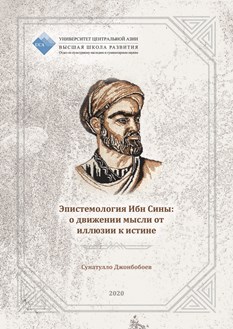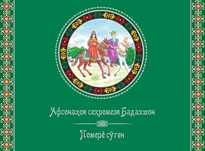Epistemology of Abu Ali ibn Sina (Avicenna): The Dynamics of Thought from Illusion towards Truth
This book (in Russian) discusses the logical and epistemological concepts of Abu Ali ibn Sina (980–1037) based on an analysis of his works on practical philosophy, particularly the logical treatises on dialectics, rhetoric, sophistry and poetics from his famous Book Kitab-ul-Shifa.
This book has been recently translated and published as the 7th volume of the Collections of Avicenna’s works at the Avicenna Studies Center of the Institute of Philosophy, Political Sciences and Law Academy of Sciences Republic of Tajikistan.
This Research Center has already translated 13 books from the Collections from Arabic into Russian and modern Tajik. The value of the treatises in vol. 7 lies in fact that the rationalistic spirit reflected in these works is deeply based on analytical methodology, reasoning, and international speculations, which fundamentally opposes the dogmatic views of his contemporaries.
It also challenges the radical views held by religious and political groups that claim ideological monopoly and thinks that reasoning should be limited to the boundaries of the Law (sharia) and to “return to the past cultural heritage”. The later radicalism is well represented by Ibn Taymiyya, Abuhamid al-Gazali and mainly by Hanbalism (the strong opponents of monopoly of Reason presented in Middle ages by Mutazilla), the forerunner of Wahhabism and now so-called Salafism. It excludes the pre-Islamic and Philosophic Cultural heritage of the Islamic period, avoids dialectical arguments, reduces every dispute of the dogmatic schools and disregards the diversity of Islam for the sake of suiting their political goal “The unity of Islam”.
The presentation is not about old and modern debates on radicalism, we are talking about the background of this discourse, about the power of Reason and reasoning in the classical time of Islam and its culture, the tradition of reasoning in Central Asia, in Bukhara and Balk in 9th and 10th centuries. Avicenna’s treatises on practical philosophy explore diverse ways to perceive the world, comprehend the laws of thought and seek rational ways to find a favorable solution to scientific, social, religious and political problems. That is to say, he exhibits a beneficial way of shifting from dogmatism and illusion to truth. The author thinks that supporting the tradition of critical and analytical thinking in modern Central Asia are important to sustain development of this region and avoid radicalization of youths.








